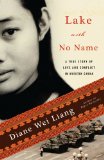Summary | Excerpt | Reviews | Beyond the Book | Readalikes | Genres & Themes | Author Bio

 Book Reviewed by:
Book Reviewed by:
Marnie Colton
Buy This Book
Chapter 1
One
Labor Camp
Plum blossom enjoys roaring snow; it should not be surprised to find a few flies frozen to death.
-- Mao Zedong, 1962
In my memory, my childhood landscape is one of paddy fields and green mountains stretching to the end of the sky, beyond clouds; air filled with the sweet scent of wildflowers, rivers meandering below, teeming with life and bamboo rafts punted by strong Miao boys sliding in and out of sight on the winding waterway. When night fell and the moon was high, love songs echoed across the river.
But my childhood was not supposed to have looked like this. All my friends, the children of my mother's colleagues, grew up on a labor camp on the east coast of China. I used to ask my parents, "Why did we go to Sichuan instead of Shandong?" Eventually, one day, they told me.
"Because that was where your father went and we decided that the family should stay together," said my mother.
"But why couldn't Baba come with you to your labor camp? My friends told me that they did not starve there and that you could do a lot of fishing too."
My mother sighed. When my parents had met, my father was a People's Liberation Army officer stationed in Beijing and my mother a college student. In those days, people had to live where their residence permit, or Hukou, was registered. Then my father retired from the army and was sent back to his hometown, Shanghai. My mother felt lucky to be allowed to stay in Beijing. Once they were married, my father was permitted to visit her in Beijing twice a year, and she was able to visit Shanghai twice a year as well. They tried very hard to gain permission to move my mother's Hukou to Shanghai, but it turned out to be more difficult than they thought. Then events overtook them.
I was born in 1966, the year of the Cultural Revolution. My parents were caught up in the chaos that swept through the country: factories stopped production; homes of Party officials and intellectuals were searched and destroyed; pidouhui, or public beatings, were conducted daily across the country. Middle school and high school students, now called the send-down youth, were transported to People's Collectives around the country to live and work with peasants. Then, in 1970, intellectuals (a term reserved for those, like my parents, who had been educated at college) began to be sent to labor camps to work "with their hands" and so to rehabilitate themselves and fulfill Mao's vision of a peasant-based society.
My mother's work unit, which was connected to the Department of Foreign Affairs, had set up their labor camp in a rather lovely part of the countryside in Shandong province, near the Yellow Sea. My father's labor camp was very different. It was in a remote mountain region in the southwest, looked down upon because it was populated with the Miao minority and had no modern living facilities. There the intellectuals were assigned hard labor, building secret military facilities against a nuclear attack from the West.
"Your mother and I had a choice," my father told me. "Either we could go to separate labor camps or your mother could exchange her place in the 'better' camp with someone from my work unit. Your mother chose to go to Sichuan with me." At this, he looked at her and smiled. They exchanged glances as naturally and effortlessly as they had exchanged their lives. It seemed that it was the simplest thing that one could do -- to be together as a family.
So the earliest memories of my childhood began in one of the most beautiful and magical regions of China. The labor camp was in the deep mountains of Nanchuan County, a region bordering Sichuan province and Yunnan province in the southwest of China. The mountains were giant, green and endless. When the rainy season came, shades of green would all smudge together into yet another nameless shade and spill over the edges, like paints dissolving on a canvas.
Copyright © 2003 by Wei Liang





The House on Biscayne Bay
by Chanel Cleeton
As death stalks a gothic mansion in Miami, the lives of two women intertwine as the past and present collide.

The Flower Sisters
by Michelle Collins Anderson
From the new Fannie Flagg of the Ozarks, a richly-woven story of family, forgiveness, and reinvention.

The Funeral Cryer by Wenyan Lu
Debut novelist Wenyan Lu brings us this witty yet profound story about one woman's midlife reawakening in contemporary rural China.
Your guide toexceptional books
BookBrowse seeks out and recommends the best in contemporary fiction and nonfiction—books that not only engage and entertain but also deepen our understanding of ourselves and the world around us.